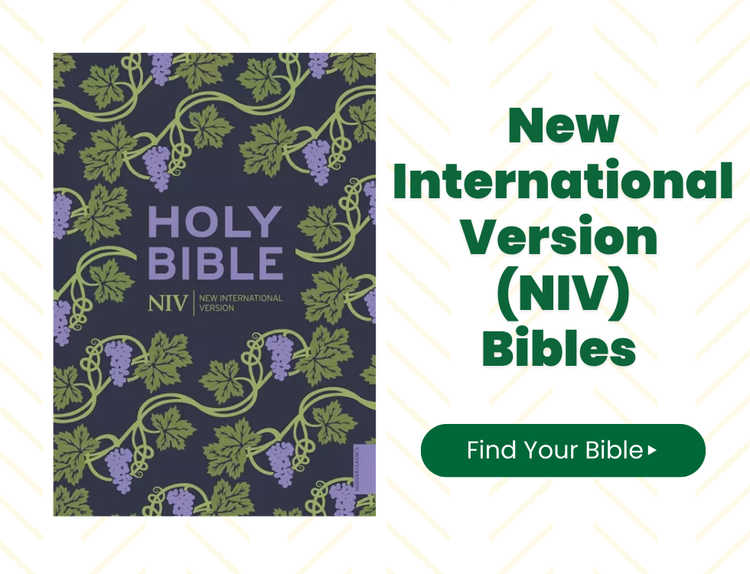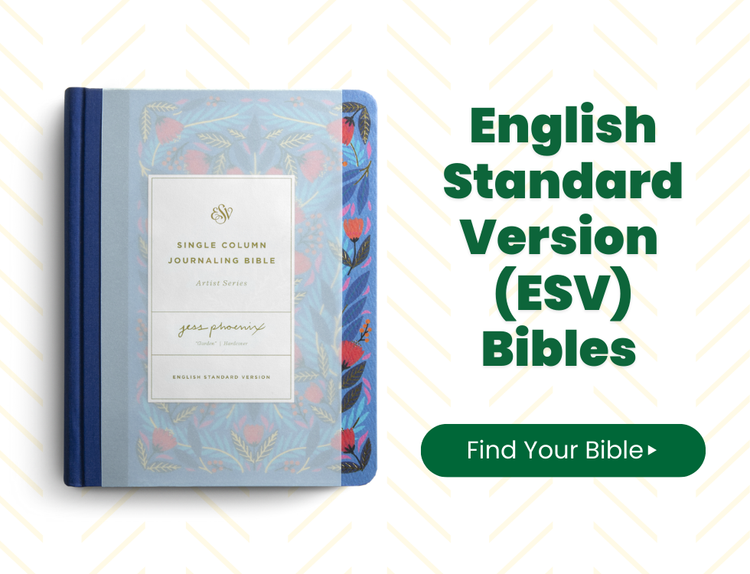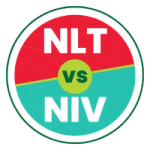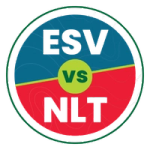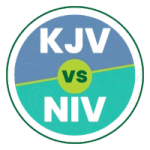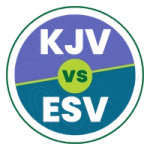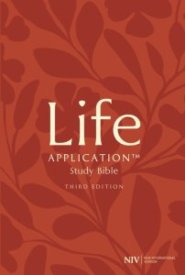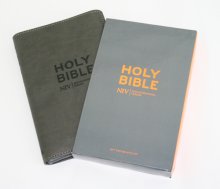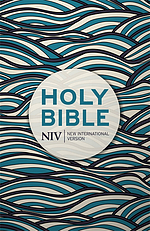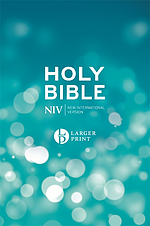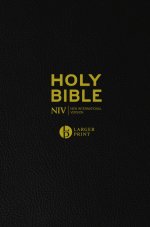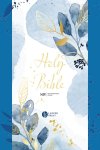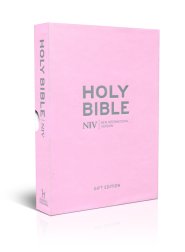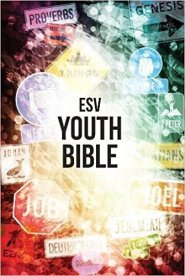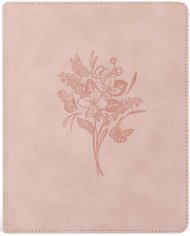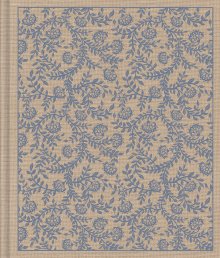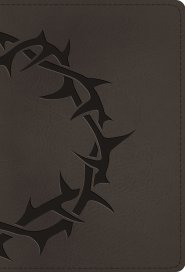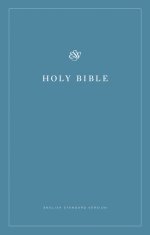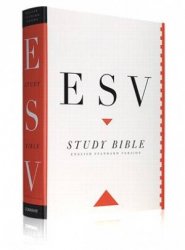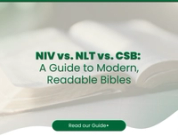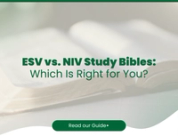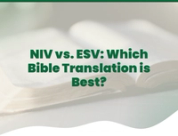When you're looking for a modern English Bible, two names consistently rise to the top: the New International Version (NIV) and the English Standard Version (ESV). Both are highly respected, widely used, and translated by teams of esteemed scholars.
But while they share a commitment to faithfully rendering God's Word, they approach the task of translation with different primary goals. This can leave you wondering: Which one is truly the best fit for me? Should I prioritise the NIV's renowned readability or the ESV's word-for-word precision?
This guide is here to help you understand the core differences, see them in action, and make a confident choice for your study, devotion, and daily reading.
In short:
The main difference between the NIV and the ESV is their translation philosophy and reading level: the ESV (English Standard Version) is a more literal, "word-for-word" translation ideal for deep, scholarly study, while the NIV (New International Version) is a "thought-for-thought" translation that offers a popular balance of accuracy and readability for everyday use.
What’s the Difference Between NIV and ESV?
The ESV (English Standard Version) and the NIV (New International Version) are both modern translations, but they take different approaches to how they translate Scripture.
The main distinction between the NIV and the ESV lies in their translation philosophy:
- NIV (New International Version): Dynamic Equivalence The NIV translators aimed to convey the original meaning and thought of the biblical authors in clear, natural, and contemporary English. This "thought-for-thought" approach (also known as dynamic equivalence) prioritises readability and understanding. The question they often asked was, "How would the original author have expressed this thought if they were speaking English today?"
- ESV (English Standard Version): Formal Equivalence ("Essentially Literal") The ESV translators aimed to provide an "essentially literal" translation, staying as close as possible to the wording and grammatical structure of the original Hebrew, Aramaic, and Greek texts. This "word-for-word" approach (also known as formal equivalence) prioritises precision and allows the reader to see more of the original form of the language. It stands in the classic tradition of the KJV and RSV.
The Reading Experience: Smooth Clarity vs. Precise Dignity
These differing philosophies result in distinct reading experiences:
- Reading the NIV: Generally feels very smooth, accessible, and easy to follow. Its language is contemporary, making it an excellent choice for daily reading, for those new to the Bible, for younger readers, and for public reading in church services where immediate comprehension is key.
- Reading the ESV: Often feels more traditional, formal, and some would say "majestic." The sentence structures can sometimes be more complex as they mirror the original languages more closely. This makes it highly valued for in-depth study, sermon preparation, and by those who appreciate a more literary or academic style.
Side-by-Side Verse Comparisons
The best way to see the difference is to look at the text itself. Here are a few examples:
John 3:16
- NIV: "For God so loved the world that he gave his one and only Son, that whoever believes in him shall not perish but have eternal life."
- ESV: "For God so loved the world, that he gave his only Son, that whoever believes in him should not perish but have eternal life." (Very similar here, as this is a straightforward verse. The ESV uses "only Son" which is a slightly more literal rendering of monogenēs than "one and only Son" which emphasises uniqueness.)
Romans 12:1
- NIV: "Therefore, I urge you, brothers and sisters, in view of God’s mercy, to offer your bodies as a living sacrifice, holy and pleasing to God—this is your true and proper worship."
- ESV: "I appeal to you therefore, brothers, by the mercies of God, to present your bodies as a living sacrifice, holy and acceptable to God, which is your spiritual worship." (The NIV uses "brothers and sisters" to reflect the inclusive meaning of the Greek adelphoi*, while the ESV uses the more traditional "brothers." The NIV's "true and proper worship" vs. ESV's "spiritual worship" for* logikēn latreian shows a slight difference in rendering a nuanced phrase.)
Psalm 23:1
- NIV: "The LORD is my shepherd, I lack nothing."
- ESV: "The LORD is my shepherd; I shall not want." (The ESV retains the classic, more poetic phrasing "I shall not want," while the NIV offers a more direct modern equivalent "I lack nothing.")
A Quick Note on Underlying Texts & Gender Language
- Underlying Texts: Both the NIV and ESV are translated from the best available modern critical editions of the Hebrew and Greek manuscripts (like the Biblia Hebraica Stuttgartensia and the Nestle-Aland Greek New Testament).
- Gender Language: The NIV often uses gender-neutral language where the original meaning is clearly inclusive of both men and women (e.g., "brothers and sisters" for the Greek adelphoi). The ESV, while also aiming for accuracy, often retains more traditional gendered language (e.g., "brothers" for adelphoi), though its translation notes may indicate inclusivity. This is a point of preference for many readers.
Quick Comparison Table
The NIV and ESV differ primarily in translation philosophy. The NIV is a 'thought-for-thought' translation balancing accuracy with modern readability, while the ESV is an 'essentially literal' or 'word-for-word' translation prized for its precision and suitability for in-depth study.
NIV or ESV: Which One Should You Choose?
There's no single "better" translation; the best one for you depends on your primary needs and preferences:
Choose the NIV if:
- You prioritise a smooth, easy-to-understand reading experience.
- You are new to the Bible or looking for a version for daily devotional reading.
- Your church or study group primarily uses the NIV.
- You want a reliable translation that effectively communicates the original meaning in natural English.
Choose the ESV if:
- You prioritise understanding the nuances of the original wording and sentence structure for deeper study.
- You are involved in teaching, preaching, or academic study.
- You appreciate a more traditional, literary style that maintains continuity with older English translations.
- You prefer a more word-for-word rendering for scripture memorisation.
Many people find it beneficial to use both an NIV and an ESV (or similar pairings) – one for broader reading and another for closer study.
Which Bible Should I Read? Take This Quick Quiz
- Do you prefer smooth, natural language or a more formal, traditional style?
- Smooth = NIV | Formal = ESV
- Are you new to the Bible or a longtime reader?
- New = NIV | Longtime = ESV
- Is your goal inspiration and reflection, or study and teaching?
- Inspiration = NIV | Study = ESV
- Will you read it aloud in a group or use it privately?
- Aloud = NIV | Private = ESV
Add up your results and see which fits your reading habits best.
Find Your Perfect Bible
Whether you're drawn to the NIV's accessible clarity or the ESV's precise dignity, the most important thing is to choose a Bible you will read, engage with, and allow God to speak to you through.
- Explore our wide range of New International Version (NIV) Bibles.
- Discover our excellent collection of English Standard Version (ESV) Bibles.
Still deciding? Our Bible Finder tool can help you compare features and find your perfect match.
Learn more with our Simple Guide to Bible Translations.
We hope this guide helps you make a confident choice in your journey with God's Word!
Final Thoughts: There’s No Wrong Choice
Choosing a Bible translation isn’t about right or wrong—it’s about fit.
What speaks clearly to you? What helps you hear God’s voice more easily?
Both the NIV and ESV are faithful, trusted translations used by millions around the world. Explore both, pray, and choose the one that stirs your soul.
"God’s Word is living and active. What matters most is that you read it."
💡 Looking for the perfect Bible? Find your NLT or NIV Bible today! → Shop Now
More Bible Translation Comparisons
Still not sure which Bible is right for you? You can learn more in our complete, free 97-page ebook, 'How to Choose Your Bible'.


